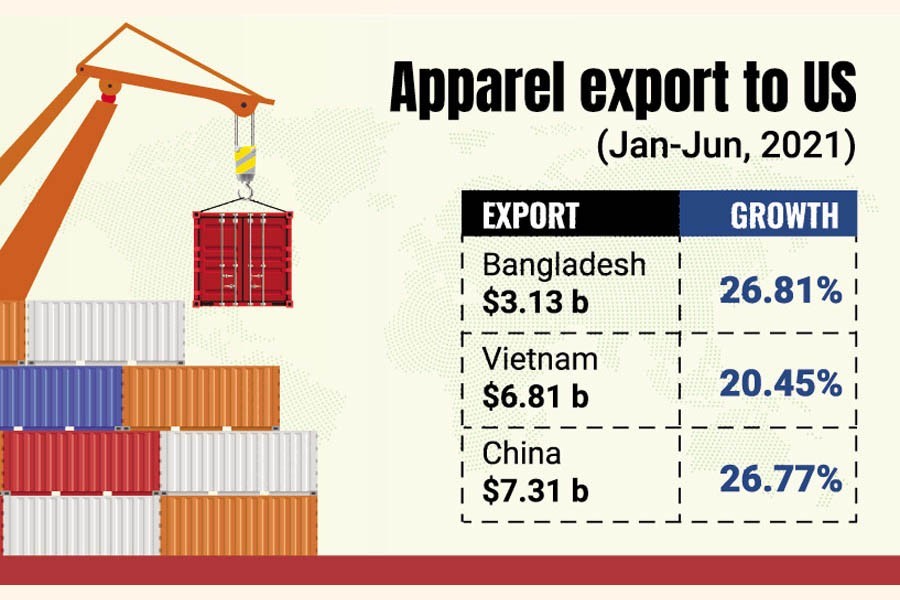The country's apparel exports to the United States recorded nearly 26.81 per cent growth to US$ 3.13 billion during the first half of 2021.
Bangladesh fetched $ 2.46 billion from readymade garment exports to its single largest destination during the January-June period of last year, according to OTEXA, an affiliate of the US Department of Commerce.
During the first half of 2021, Bangladesh's main competitors China and Vietnam recorded 26.77 per cent and 20.45 per cent growth respectively.
Gradual economic recovery aided by the Covid-19 vaccination coverage, better control in coronavirus infection and a shift of orders from China have helped achieve the double digit growth, apparel exporters and experts said.
They said the US has been very 'conservative' in purchasing apparel items due to the pandemic, but now they have started placing orders to cater for their growing demands.
Bangladesh is now in a better position with its capacity to supply the products though the lead time is still a concern, they added.
During the first six months of 2021, Bangladesh shipped 1.22 billion square metres of apparel
items, up 37.14 per cent from 890 million square metres of the same period of last year.
Only in June 2021, Bangladesh shipped 192.77 million square metres of apparel items, up from 82.57 million square meters or 133 per cent.
The RMG exports to the USA stood at $5.22 billion in 2020, down from $5.92 billion in 2019, according to the data.
The overall apparel imports of USA from across the world during the period under review also increased by 26.92 per cent to US$ 35.37 billion from $27.87 billion during the same period of 2020, data showed.
During the first half of 2021, the US imported apparels worth $ 7.31 billion from China and $ 6.81 billion from Vietnam.
Apparel exports from other major sourcing destinations including Cambodia, India, Mexico and Pakistan also grew ranging from 13 per cent to 66 per cent except Indonesia that was maintaining a slow growth of 3.16 per cent.
When asked, Shovon Islam, managing director of Sparrow Group of Industries, said that due to Covid-19, buyers were 'conservative in placing orders and purchasing' and, as a result, they were running out of products with people going back to work amid recovery in economic activities.
The USA needed products due to the growing demands there and Bangladesh is ready with its capacity, he said, explaining the reasons behind the growth.
"Also, we are doing diversified and value added products that is also helping attract more buyers," Mr Islam said.
Talking to the FE, Mahmud Hasan Khan, a director of Bangladesh Garment Manufacturers and Exporters Association (BGMEA), said the US economy was slowly recovering from the adverse impact of Covid-19 with the rise in consumer spending.
The trade war between China and the US has also diverted some buyers to Bangladesh, he said. He, however, stressed on timely shipment, quality and 'reasonable' price to sustain the growth.
Terming both the growth and future trend 'positive', Kazi Iftekher Hossain, president of Bangladesh Garment Buying House Association (BGBA), however, raised a question about how long Bangladesh would be able to continue with such a trend.
The lockdown is disrupting the supply chain which might affect the growth, he said.
"Bangladesh is still largely dependent on basic items while Vietnam produces value added products and the latter's productivity is much higher than us," he noted.
Echoing the BGBA leader, Dr Khondaker Golam Moazzem, research director at the Center for Policy Dialogue also stressed on the need for product diversification and production of artificial and man made fibre to grab the larger share of orders shifting from China.
Though Vietnam and China's exports to US were more than double as compared to Bangladesh, Bangladesh registered higher growth than the competitors, which he termed positive, saying it has a great impact on bringing more remittance and creating employment. Bangladesh might have some advantages over Vietnam's currency appreciation in recent months, he noted.
According to a latest report of the United States Fashion Industry Association (USFIA), Bangladesh's price competitiveness would continue to attract more US apparel companies to source from the country in the next two years.
It, however, termed the local industry's much concentration on basic items as 'competitive disadvantage' and observed that diversifying the product structure and improving production flexibility and agility would be critical for the country to play a more significant role as an apparel sourcing base for US fashion companies in the post-COVID world.
The surging sourcing costs still remained a significant concern to US fashion companies in 2021 and the US-China tariff war exacerbated the sourcing cost pressures and financial challenges facing US fashion companies during the pandemic.


